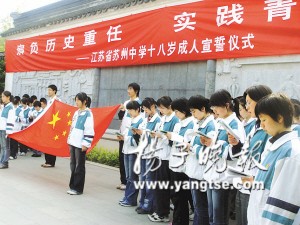
9.29.2009
《大路西遊2之(阿)公審三藏 》:一場獨立思考的一種「演練」
假如 閣下打算安坐劇院舒適的座椅上,默默地欣賞一場賞心悅目的劇作,恐怕您將與這個創作最精彩的部分失之交臂。因為《大路西遊2之(阿)公審三藏 》(下稱《大路西遊2》)壓根兒不是單純以「賞心悅目」為終極目標的演出(當然筆者並不排除演出具「賞心悅目」的元素),而是需要參與者投入的「文化事件」(‘cultural event’)。更具體而言,這是一個探討獨立思考的創作項目——不單是以獨立思考為「題材」的劇作,從何應豐的文本創作、演員在排練室的創造、陳國平的音樂創作、以至與觀眾於劇場的交流和從而產生的「再創造」,整個創作都是獨立思考的一種「演練」和「成品」。在讓大家進一步了解《大路西遊2》如何於不同創作階段引發不同個體獨立思考、同時在不同個體參與下有機成長前,筆者先略述《大路西遊2》的創作緣起。
《大路西遊2》的構思蘊釀於京奧前夕,四川大地震和「太湖衛士」吳立紅被判刑事件,喚起了何應豐沉澱多時、有關「大開發」的種種思考。「那情況十分吊詭,我們可以大灑金錢向世界宣示中國有多強大的同時,從不會想到用這些資源用來做好國內的人文建設、學校、機建建設……」有感當時所有人都只是盲從於「發展就是硬道理」的迷思當中,卻沒有深思「發展」背後的可能性,以致在大家一窩蜂埋首於國家的經濟建設、為經濟發展一日千里而眉飛色舞的同時,在文化、精神方面的發展乏善可陳,何應豐便想到創作延續七年前的作品《大路西遊》,創作《大路西遊2》。
「假如二零零三年的《大路西遊》是探索中國西北大開發背後的荒誕,《大路西遊2之(阿)公審三藏》恐怕是借一件假設的懸案,想像在一個不尋常國度裡的「一個香港人」 ,如何撞上 「開發行動」背後「妄想」的「話頭」罷。」[1]
相比《大路西遊》,《大路西遊2》以北上的香港律師作為敘事中心的設定更加貼近港人處境。誠然,內地與香港的關係已今非昔比,隨著中港日趨一體化,對於「開發」的種種問題,我們已不能抱著隔岸觀火或視而不見的態度——不同名目的「活化」計劃把舊有的多元文化摧毀,在超級商業集團承包管理下,一個個蒼白和單一的「品牌」和「地標」在頹垣之上被打造出來……這不正是「中國香港」的寫照嗎?
「在行政主導的情況下,很多情況只講程序(procedure)而不需要講理據。人們只依循已制定下來的規則行事,從不懷疑。雖然歷史說明了規則非永恆,隨時間和文化發展它必需變化,但我們總有一個妄想:當一個人有了經驗和建樹,便會覺得它是永恆的,希望透過抱持它們從而得到安全感。這是一個吊詭,我們在不同年紀都有一種社會責任將某種文化傳承——不是告訴下一代要如何做人,而是將一些經驗分享出去,由他們決定怎樣做他們的夢想。然而,大部分人都只是抱持著一些他們自以為成功的案例,將之成為大家要依循的規則。這是很危險的。」
這種「行政過於一切」的因循態度在「中國香港」中顯而易見,曾特首的名句「我要做好呢份工」,正是社會在行政主導下,以高效率(高經濟效益)和安守本份為最高品德情操的最佳寫照。在這種缺乏自主性、鼓吹單一思維的氛圍下,教育界所倡議的「通識教育」、「獨立思考」豈不是另一個蒼白的口號?
獨立思考重視的不是被約化、被歸納的「已知」答案,而是通過主動、積極的探索過程,走向種種「未知」的可能性。《大路西遊2》的創作過程正好體現這種精神,更準確而言,它本身就是一個獨立思考的演練和產物——從編劇、演員排練、音樂設計,以至觀眾參與,《大路西遊2》在不同階段一直保持讓不同個體創造、思考的開放性,亦有意識地誘導不同的參與者投入其中。
在演員的創作過程中,每一個獨特的個體對文本的詮釋賦予何應豐很多不同的想像,特別是他每次的創作都會找來很多來自不同背景的演員或創作人合作,大大擴展了創作的未知性和可能性。「每個人身上都有著某種共通共融的特質,而且不同個體之間的對話、交流可以開拓彼此視野,令我們不致局限於某種平常的慣性去看事物。」經過演員的投入創造,作品得以進一步豐富、成長。
何應豐期望,《大路西遊2》的演員不是單純的「說書人」,走進劇場的觀眾也不是單純來「聽故事的人」。「大部分聽故事的人都認為自己不用負責任,我很不喜歡這樣的對話。事實上,『生活』貴乎能否活在當下、投入眼前 ,‘Being’與‘becoming’是很關鍵的存在問題,當你坐在觀眾席中,你的內在世界是否甚麼也沒有發生?你應該如何參與、投入一個眼前的event/事件?」何應豐認為觀眾不應作為被動的接收者,而是交流、對話的對象。「他們不是普遍的、單一的群眾(generalized mass),他們每一個都是獨立個體,在黑暗之中各自找尋自己的線索和定位。我們要給予他們空間,容許他們從既有的思考模式中釋放出來,重新創造與建構他們的想法。」他認為,觀眾如何與他和演員所建構的文化事件建立對話,正是劇場中最引人入勝、最精彩的創作。這已不是單純的消費,而是一種具創造性的思考和行為。「戲劇/藝術本身是一個行動(action)——既是建構一個事件,也是透過行動去疏理一些平時沒機會思考、或疏理得不夠清楚深入的思緒。」
正如文章開首所言,《大路西遊2》是一個需要參與者(包括創作人、演員和觀眾)主動投入(engage)的文化事件(cultural event),在人人都在等指示、等上級作決定(但同時又充滿投訴、怨氣,認為自己永遠不用負責任)的社會中,這正是我們所急切需要的。「如果我們想建構一種有機、有活力的文化,這就先必須孕育一種條件。我相信,如果每一個人都將自己視為獨立個體,重視自己可以引發的可能性,同時又能包容、欣賞每個人的精彩,這個社會就可能會孕育出一種共融的美麗,而且它並不遠。」
伍綺琪 28/09/2009
9.24.2009
From 1984 to One-Dimensional Man: Critical Reflections on Orwell and Marcuse
Section One
By Douglas Kellner
Occasionally literary and philosophical metaphors and images enter the domain of popular discourse and consciousness. Images in Uncle Tom's Cabin of humane and oppressed blacks contrasted to inhumane slave owners and overseers shaped many people's negative images of slavery. And in nineteenth century Russia, Chernyshevsky's novel What is to be Done? shaped a generation of young Russian's views of oppressive features of their society, including V.I. Lenin who took the question posed by Chernyshevsky's novel as the title of one of his early revolutionary treatises. In the twentieth century, George Orwell's vision of totalitarian society in his novel 1984 has had a major impact on how many people see, understand, and talk about contemporary social trends. {1} Subsequently, Herbert Marcuse's analyses and images of a "one-dimensional man" in a "one-dimensional society" shaped many young radicals' ways of seeing and experiencing life in advanced capitalist society during the 1960s and 1970s --though to a more limited extent and within more restricted circles than Orwell's writings which are among the most widely read and discussed works of the century.
excerpts from http://www.gseis.ucla.edu/faculty/kellner/Illumina%20Folder/kell13.htm
Section Two [http://www.gseis.ucla.edu/faculty/kellner/Illumina%20Folder/kell13a.htm]
One-Dimensional Man in The Postmodern Age
Re-Thinking The Bourgeois Subject, Toward the Sensibilities of Freedom.
J.L. Hinman
...a social totality integrated under the universal form of commodity production. Under the domination of the commodity structure, a phantom objectivity is conferred upon human relations, transforming social relations into relations between things; subjectivity, the consciousness, comes to reflect and reproduce this system of domination, giving it the character of a `second nature.' 1
In other words, the mode of production shapes a total way of life that revolves around commodity. This process, rather than labor alone as in traditional Marxism, creates the bond of social relations. This ensemble forges an obedient subject. Within that framework class struggle and exploitation exist as historical contingencies. The alienated subject is itself a product of the way of life.2 (CLICK TO LINK FULL ARTICLE)
EXCERPTS FROM http://www.datawranglers.com/negations/issues/97f/97F_jhinman2.html
Negative Thinking: The Defeated Logic of Protest
Herbert Marcuse: One-Dimensional Man
(Boston: Beacon, 1964)
Part II: One-Dimensional Thought
http://books.google.com/books?id=63QdLKsuqCwC&dq=one+dimensional+man&printsec=frontcover&source=bn&hl=en&ei=SGC7SoOYKYXs6AP72uGECg&sa=X&oi=book_result&ct=result&resnum=5#v=onepage&q=&f=false
Herbert Marcuse:One-Dimensional Man
The Paralysis of Criticism: Society Without Opposition
excerpts from http://www.marcuse.org/herbert/pubs/64onedim/odmintro.html |
9.21.2009
龙应台:香港,你往哪里去?
9.16.2009
9.15.2009
HOW DOES EDUCATION PARALYZE INDEPENDENT THINKING?
CRITICAL UNDERSTANDING AND CRITICAL THINKING IN SCIENCE EDUCATION
1. A CRISIS IN SCIENCE EDUCATION
There has been a growing awareness all over the world that the current approach to science education is unsatisfactory in many ways. Books by educators and professional scientific journals devoted to research have repeatedly voiced this concern. In his book The Unschooled Mind, for instance, Howard Gardner describes how otherwise competent college students do not “really understand” what they have learnt, even when they show a high degree of understanding in solving problems of the textbook type (Gardner 1993). In his Science editorial, “Science: A Mountain or a Stream,” Don E. Detmer (1997) expresses the warning: “If we remain dedicated to minor revisions of past educational approaches, our prospects will be dim indeed.” In his Scientific American article in the section on Trends in Science Education, Tim Beardsley (1992) documents an extensive list of similar concerns. The 1991 Carnegie Commission on Science, Technology and Government states that the situation is “a chronic and serious threat” to the future...(click to link full article)
Fostering Independent Thinking
9.13.2009
Clean Water Laws Are Neglected, at a Cost in Human Suffering
9.12.2009
渴望墮落:談當代中國知識份子的痞子化
9.11.2009
In China, You Play By Another Set Of Rules
做官先做人:重讀《岳陽樓記》隨感
岳陽樓記根本在說生命高度這碼子事
9.10.2009
西部大开发的环境忧思 / 何清涟
王力雄:西部大開發
那次開發也可以被冠以“大”字,所謂“力度”不亞於今天。資金投入以今天概念衡量可能不算多,但那時社會的最大資源是人力,從這種資源衡量,投入是相當巨大的。
新疆生産建設兵團最初由十幾萬解放軍官兵就地轉業組成,隨後由政府組織內地勞動力遷入而不斷擴大。1956年僅河南一省就有5萬青年被送到兵團。從1957年到1966年,兵團職工人數由17.8萬人增長到80.8萬人。其中國家有組織地大批調入的有:1959-1960年,安徽、江蘇、湖北三省的青壯勞動力近10萬人;1963-1966年,上海、天津、北京、武漢、浙江、江蘇的青年學生12萬人;還有復員士兵和轉業軍官8萬人;饑荒時期“自流”入疆的21萬人;職工子女9萬人;以及12萬名交由兵團“勞動改造”的犯人,刑滿後大部分留在兵團。 到1966年,兵團的職工加上家屬,人口總數已達到148.5萬人。(click to link full article)
──轉自《遞進民主》2/4/2004
9.08.2009
9.07.2009
What is Independent Thinking?
Independent thinking means making sense of the world based on your own observations and experiences rather than just depending on the word of others. It means trusting your own ability to make judgments, even if they contradict what others say. It means acting in accordance with these judgments, even if you sometimes make mistakes. An independent thinkers knows it's psychologically better to make your own mistakes than someone else's...(click to link)
The Importance of Being Nothingness
Craig Hogan / book reviews
Two recent books delve into Nothing from very different perspectives. In The Hole in the Universe, K. C. Cole, from the behind-the-scenes perspective of a science journalist, heads for the banter—the endlessly creative attempts of scientists to explain things to each other and to others in colorful and trenchant metaphors. In The Book of Nothing, J. D. Barrow explores, with meticulous scholarly attention to detail, thousands of years of philosophy, mathematics, physics and theology organized around the concept of Nothingness....(click to link)
9.06.2009
The Organization Man, Pt. 1: The Ideology Of
I'm on a looong flight tonight, from Columbus to San Francisco, via Charlotte. (Yes, I flew an hour East to grab a West-bound plane.) Usually on a flight, I like to keep my reading material light. Super-light... like, Marine Sniper: 93 Confirmed Kills, or Tom Clancy, or anything I think I'll reasonably be able tofinish in 10-12 hours of reading (two trips' worth.) For some reason it depresses me to arrive home with a half-finished book, knowing that I'll probably set it aside just long enough for my interest in it to wane.
But tonight I brought along an old nugget that's been gathering dust on my bookshelf since college: The Organization Man, by William H. Whyte, Jr. It was published in 1956, and hailed at the time (and really ever since) as an important sociological treatise. This is not light reading...(click to link)
excerpts from SOLDIER ANT




